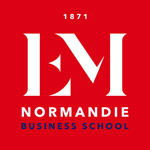Supply Chain & Lean Management courses
EM Normandie Business School

- France
- World Rank : -
- Visit Website

The MSc Supply Chain Management programme trains executives who are able to manage all Supply Chain operations: flows within the company and between the company and its environment (Supplies, Warehousing, Delivery, Transactions,…).
Learning objectives
Defining the range of resources, means, methods, tools and techniques required to operate the global Supply Chain from the first supplier to the end customer as efficiently as possible.
Strong points
General information about the employment market
The Logistics and Transport Industry is dynamic and operating smoothly. Currently responsible for over 2 million jobs in France, the market is set to expand by around 1.5% per year. The constant growth of E-commerce supported by new technologies, related consumer habits and the impact of Big Data are creating change and causing companies, particularly in industry, to rethink how they are organised and how their systems operate. New skills such as interdisciplinary expertise are expected, with more capacity to progress in an international and multicultural environment where mobility and the ability to bring together virtual teams are keys to success.
Career Prospects
Activity sectors include Transport, Mass Retail or Industrial Production as well as Services such as Banking or Insurance:
Graduate employment data based on 2019 employability survey
Academic qualification equivalents
Students who hold a four-year bachelor degree or equivalent
English language requirements (one of the below):
The tuition fees and expenses for attending EM Normandie Business School in France can vary depending on the program, location, and individual circumstances. Here, I'll provide you with a general idea of the average tuition fees and some common expenses associated with studying at EM Normandie:
1. Tuition Fees:
The tuition fees at EM Normandie can vary based on the level of study (bachelor's, master's, MBA, etc.) and the specific program you choose. Additionally, international students may have different fee structures than European Union (EU) or French students. Here is a rough estimate of the average tuition fees for different levels of study at EM Normandie:
It's important to note that tuition fees can change over time, and different programs within EM Normandie may have different fee structures. Be sure to check the official EM Normandie website or contact the school directly for the most up-to-date and program-specific tuition information.
2. Additional Expenses:
In addition to tuition fees, students should budget for various expenses while studying at EM Normandie:
It's important to create a detailed budget tailored to your specific circumstances and lifestyle choices. Additionally, consider any scholarships, grants, or financial aid opportunities that may be available to help offset your tuition and living costs.
Keep in mind that the cost of living and tuition fees can vary based on the campus location (e.g., Le Havre, Caen, Paris), so research the specific costs associated with your chosen campus and program. Lastly, ensure that you have sufficient funds to cover your expenses during your entire stay in France to enjoy a comfortable and successful academic experience at EM Normandie Business School.
| Tuition Fees in France (1st Year Average) | MBA: Euro 18344 | MS: Euro 7880 | MIM: Euro 14210 | BBA: Euro 10464 | MFin: Euro 17960 | BSc: Euro 15373 |
| Average Accomodation & Food Costs in France | Euros 600 to 800 Per Month |
| Entrance Exams in France | TOEFL: 83 | IELTS: 6 | PTE: 62 | GRE: 301 | GMAT: 540 One can also Study in France without IELTS |
| Work and Study in France | Permitted for 20 hours/week with a valid study permit. |
| Post Study Work Permit in France | 2 Years after graduation depending on the course. |
| Cost of Student Visa in France | 99 Euros |
| Student Visa in France | Depending on your purpose i.e. whether you are going for a visit, for pursuing higher education or for work, there are 3 types of visas i.e. Schengen Student Visa, Visa to sit in Placement test and Long Stay Visa. |
| Intakes in France | There are Two Intakes in France: Fall (September) and Spring (January/March) |
| Top Job Sectors in France | Information Technology, Banking and Finance, Engineering, Tourism & Hospitality, Fashion. |
| Economy in France | GDP Growth of 2.3% (2017) 1.7% (2018) 1.2% (2019), 5.5% (2021e) 7th Largest Economy of the World by Nominal |
Tuition & fees :
€ 12,500
Total
€ 12,500